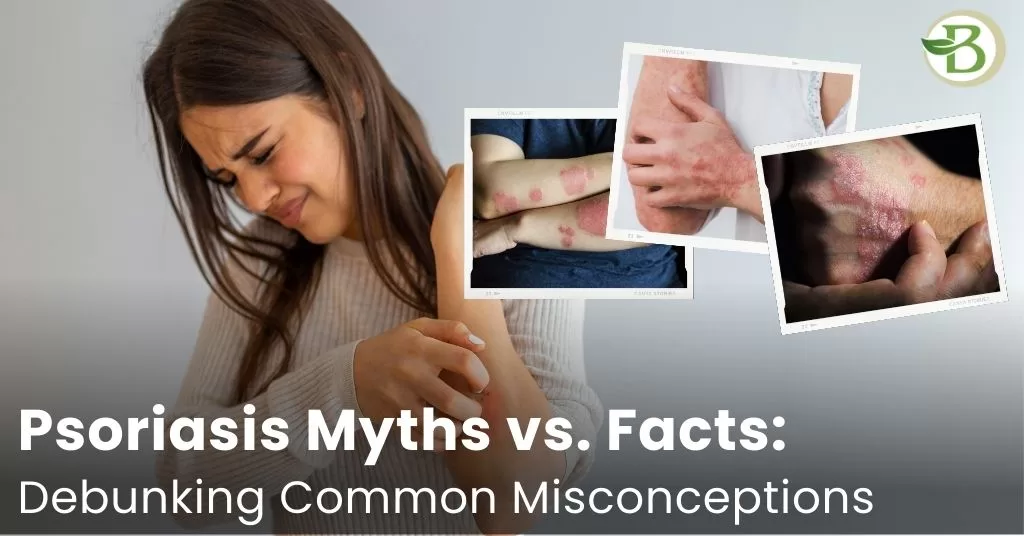Psoriasis Misconceptions: Separating Facts from Fiction
Millions of individuals worldwide suffer from psoriasis, a chronic skin condition that is sometimes misinterpreted. For people who have the illness, this misunderstanding gives birth to a number of myths and falsehoods that may make their lives even more difficult. We aim to promote a more sympathetic and understanding view of psoriasis by dispelling these myths and exposing the psoriasis facts. Let us examine some of the most prevalent psoriasis misconception and reveal the underlying facts.
Myth: Psoriasis is contagious
Fact: It is not contagious
This is possibly one of the most common serious misconceptions about psoriasis. It’s an autoimmune condition in which the immune system erroneously targets the body’s own cells. Sadly, this misunderstanding often causes people with psoriasis to face unnecessary social isolation. To combat this, it’s crucial to educate others that white patches on skin cannot be transmitted through touch or close contact.
Myth: Psoriasis is just a skin disease
Fact: It is more than a skin condition; it is a systemic disease
Psoriasis isn’t just about red, scaly skin patches. It goes beyond that and can seriously impact your overall health. It’s linked to conditions like psoriatic arthritis, cardiovascular disease, diabetes, and depression. Knowing that white patches on the skin affect your whole body emphasises the need for comprehensive care and support for those dealing with it.
Myth: Only adults get psoriasis
Fact: It can affect all age groups
Even though psoriasis is commonly seen in adults, it can also affect children and teenagers. Early detection and treatment are necessary for controlling symptoms and avoiding complications. Managing pediatric psoriasis can be challenging because of the emotional and psychological effects on young patients, so having support from family, friends, and educators is crucial.
Myth: Psoriasis is caused by poor hygiene
Fact: It is not related to cleanliness
Contrary to popular belief, white patches on the skin are not influenced by personal hygiene but are an autoimmune condition. The misconception that psoriasis is due to poor hygiene can contribute to stigma and misunderstanding. People with white patches on their skin often have strict skincare routines to manage their symptoms, so it’s important to debunk this myth and create a more supportive environment.
Myth: Psoriasis is rare
Fact: It is relatively common
As the World Psoriasis Day consortium reported, around 125 million people worldwide have psoriasis. In the United States, approximately 7.5 million individuals live with this condition. Understanding the prevalence of white patches on the skin can help advocate for more research, funding, and resources to assist those affected.
Myth: Psoriasis only affects the skin
Fact: It can have wide-ranging effects beyond the skin.
As we mentioned before, psoriasis comes with a bunch of other problems, like psoriatic arthritis, which messes with your joints. This arthritis can make your joints hurt, feel stiff, and swell up, making it challenging to move around and live your life. Plus, the ongoing inflammation in psoriasis patients puts them at an increased risk of cardiovascular disease and other health problems.
Myth: Psoriasis is caused by a poor diet
Fact: While diet can impact overall health, it does not cause psoriasis
There isn’t a magic diet that can make white patches on the skin disappear, but eating healthy can definitely help control inflammation and make you feel better overall. It can assist in managing inflammation and enhancing your general health, which can be beneficial for individuals dealing with white patches on the skin. If you observe that certain foods trigger your symptoms, avoiding them might be a good idea. Getting advice from a healthcare professional or a dietitian can aid you in establishing a comprehensive diet plan that boosts your overall health.
Myth: Sun exposure always helps psoriasis
Fact: Sun exposure can sometimes help but must be approached with caution
Believe it or not, a little sun can work wonders for certain individuals with psoriasis. The anti-inflammatory effects of UV light can help alleviate symptoms of skin psoriasis. However, it’s important to exercise caution and not overdo it. If you spend too much time under the sun, you might end up with a nasty sunburn, which could potentially make your white patches on the skin worse or increase the risk of getting skin cancer. So, it’s essential for people with white patches on their skin to strike a balance and ensure they protect their skin.
Myth: Stress causes psoriasis
Fact: Stress does not cause it but can exacerbate it
It’s worth noting that stress isn’t the cause of white patches on the skin, but it can definitely trigger flare-ups and worsen symptoms. If you’re living with white patches on the skin, incorporating stress management techniques like mindfulness, meditation, exercise, and therapy into your routine can be really helpful. Recognizing the correlation between stress and psoriasis allows you to take proactive measures to reduce stress and promote your overall well-being.
Myth: Psoriasis is just a cosmetic issue
Fact: It is a serious medical condition that significantly impacts quality of life
Psoriasis isn’t just a skin problem – it can take a toll on your emotions, too, leading to issues like depression and anxiety. The visible effects of the condition can affect your self-esteem and social life, so it’s crucial to manage both the physical and emotional sides of living with psoriasis. Patients require holistic care and support to manage all aspects of the condition effectively.
Myth: Psoriasis treatments are all the same
Fact: Treatments are varied and should be tailored to the individual
Treating white patches on the skin isn’t a one-size-fits-all situation. The methods used can differ based on the severity of the disease, the type of psoriasis, and the patient’s overall health and lifestyle. Collaborating with a healthcare provider to come up with a customised treatment plan is key.
Myth: Natural remedies can cure psoriasis
Fact: While some natural remedies may help alleviate symptoms, they do not cure it
You’ll come across plenty of natural and alternative treatments for white patches on the skin, such as aloe vera, apple cider vinegar, and dietary supplements. Although these remedies may relieve some individuals, they can’t replace the medical treatments healthcare professionals prescribe. It’s crucial to approach natural remedies with caution and have a conversation with your doctor to ensure they won’t interfere with your conventional treatments.
Myth: Psoriasis symptoms are always severe
Fact: Its symptoms can vary widely from person to person
White patches on the skin can vary greatly in severity, from small dry patches to extensive coverage that impacts daily life. While some may have occasional flare-ups, others may deal with persistent psoriasis symptoms. It’s crucial to acknowledge the uniqueness of each individual’s psoriasis experience.
Myth: People with psoriasis should avoid exercise
Fact: Exercise can be beneficial for people with psoriasis
Engaging in consistent routine activity is essential for preserving overall well-being and can substantially impact stress management, improve cardiovascular health, and reduce inflammation. These advantages are especially beneficial for those with white patches on the skin. It is important to choose exercises that do not irritate the skin and consult with a healthcare provider for personalised recommendations. Swimming, for example, is an excellent option as it is low-impact and can offer soothing effects for the skin.
Key Takeaway
Psoriasis is a complex condition that is often misconstrued, affecting millions of people worldwide. By debunking common psoriasis myths and grasping the facts, we can cultivate a more sympathetic and supportive environment for individuals with psoriasis. Knowledge is crucial, and by spreading accurate information, we can help diminish stigma, foster empathy, and enhance the quality of life for those with white patches on the skin. Whether you are personally affected by white patches on the skin or supporting someone who is, understanding the truth behind the myths is a vital step towards increased awareness and improved care.
Treatment at Bharat Homeopathy
Managing white patches on the skin requires a well-rounded approach that addresses the disorder’s physical and psychological aspects. Homeopathy, with its individualised and holistic approach, presents a viable and permanent solution for psoriasis for many individuals. By incorporating homeopathic medicines, one can experience the most favourable results.
When it comes to finding the most effective and natural treatment for psoriasis, Bharat Homeopathy is the ultimate choice. Our remarkable and impressive track record speaks for itself, as we have successfully treated numerous illnesses. Our team of skilled and experienced homeopathic physicians is fully committed to offering the best homeopathic treatment for psoriasis. We take a comprehensive approach, considering each patient’s specific needs and the symptoms of white patches on the skin. By combining advanced medical research with traditional homeopathic principles, we deliver long-term and positive results to our patients. Trust Bharat Homeopathy to cure psoriasis permanently and witness remarkable improvements in overall skin health and well-being.


